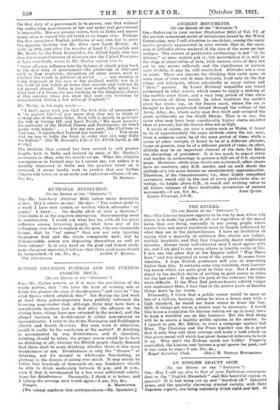LONDON LICENSING JUSTICES AND THE EVENING CLOSING HOUR.
[TO THE EDITOR OF THE " SPECTATOR."1
SIR,—Mr. Carter asserts,- as if it were the conclusion of the -whole matter, that " the- later the hoar of evening sale of drink the greater the sum of druekennese," and says he " has cited figures which establish this." Yet daring' the last week at least three police-inspectors have pulifielY informed' the licensing magistrates that, although there may have been a considerable increase just at first after the advance in the closing hour, things have- now returned to the normal, and' the alleged increase, in- drunkenness' ia either non-existent or inconsiderable. I refer to the Stoke Newington and Paddington (North and South) districts. But even were it otherwise, would it really be the conclusion of the matt-ere If drinking is accompanied by any drunkenness, and if, therefore, drinking should' be taboo, the proper course would be to have no drinking at all; whereas the' British people clearly demand that there shall be some drinking, whether there is also some drunkenness or not. Drunkenness is only the " dieease" of drinking, not its normal or wholesome functioning, as gluttony is the disease of eating over much. It may surely be better that hundreds of thousands of.. say, Londoners should be able to drink moderately between 10 p.m. and 11 p.m., even it that is accompanied by a few score additional convic- tions for drunkenness. Personally, I think it is- better, and I believe the average man would agree.—I am, Sir, 4c.,






































 Previous page
Previous page